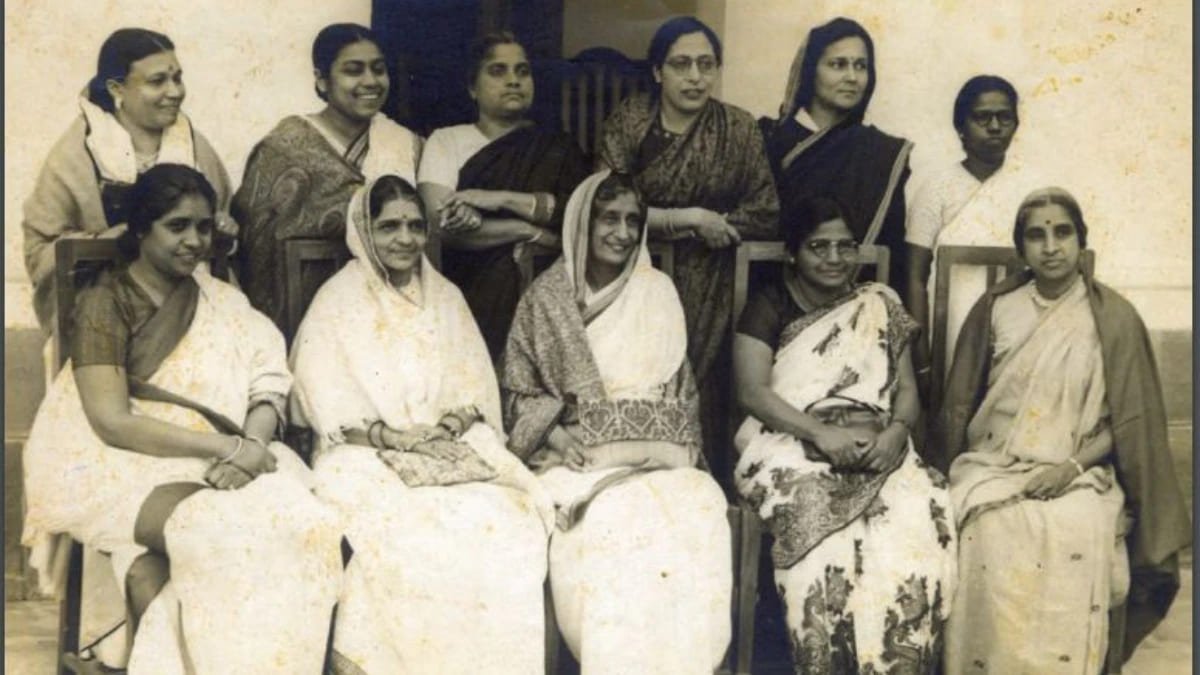As we pledge on the Constitution it is important to know more about its structure and democratic values
Introduction to Women Members of the Constituent Assembly – Part 1
In the Constituent Assembly, in total, there were 15 women members, none of whom were part of the Drafting Committee. Each member made a notable contribution to the discussion. Interestingly, it is instructive that none of the female members supported measures such as positive discrimination or separate electorates based on gender or communal lines.
1. Ammu Swaminathan: As a social worker and politician, she played a pivotal role in the formation of the Women’s India Association in 1917 in Madras, alongside prominent figures such as Annie Besant, Margaret Cousins, Malathi Patwardhan, Mrs. Dadabhoy, and Mrs. Ambujammal. She was a staunch supporter of Fundamental Rights and Directive Principles of State Policy, considering them the cornerstone of the Despite belonging to an upper-caste herself, she vehemently opposed discriminatory caste practices and advocated for equal status, adult franchise, and the eradication of untouchability. Notably, she was among those who found the constitution excessively lengthy and cumbersome, proposing instead that it should be compact enough to be carried in one’s wallet.
2. Annie Mascarene: Annie Mascarene was a fervent advocate for democracy and provincial elections, exemplified by her election to the First Lok Sabha during the Indian general election of 1951. She emerged as the inaugural woman Member of Parliament from Kerala, a significant milestone in the region’s political landscape. Her election marked a historic moment as she stood among a mere ten women elected to Parliament in the elections.
3. Begum Aizaz Rasul: She was the sole Muslim woman in the Constituent Assembly, representing the United Provinces as a member of the Muslim Although she did not serve on any committees within the Assembly, her contributions were notable. Advocating for crucial issues, she emphasised national language, reservation and property rights, as well as fundamental and minority rights. Actively participating in debates, she addressed topics such as the autonomy of ministers from party affiliations, electoral systems, and India’s membership in the Commonwealth. While championing Fundamental Rights, she expressed optimism about women attaining equality of opportunity under the new constitution. Interestingly, she opposed the notion of special reservations for Muslim women. Through her extensive involvement, she played a vital role in shaping discussions and perspectives within the Constituent Assembly.
4. Dakshayani Velayudan:. Dakshayani was the only Dalit woman member of the Constituent Assembly. She courageously raised critical issues such as untouchability, forced labour, reservations, and the debate against separate electorates for Firmly believing in the eradication of untouchability, she advocated for a multifaceted approach, emphasising sustained state propaganda and a campaign-based strategy. She asserted that embedding this commitment within the constitution was crucial for practical impact, emphasising the need to eliminate the practice effectively. In her vision for the Indian Republic, she passionately declared that caste or community would not serve as barriers, advocating for a society founded on principles of equality and inclusivity.
5. Durgabai Deshmukh: Durgabai was one of the members to strongly oppose and speak on human trafficking and promoted judicial independence. Within the constituent assembly, she specifically addressed the appointment of high court judges and advocated for the establishment of new high courts in emerging provinces. Emphasising the importance of maintaining the autonomy of institutional organs, particularly underscoring the need for an independent judiciary, she praised the inclusion of provisions offering constitutional remedies. Notably, she expressed the belief that “a right without an expeditious and effective remedy serves no purpose at all, nor is it worth the paper on which it is written.” In addition, she fervently supported the establishment of the Supreme Court as the guardian of the constitution. Her engagement in discussions related to the Protection of Children and Youth from Exploitation and Abandonment further showcased her commitment to addressing critical societal issues.
6. Hansa Mehta: Hansa Mehta passionately advocated for the pursuit of social, economic, and political justice for women, emphasising that such equality serves as the fundamental cornerstone for fostering mutual respect and understanding. She firmly believed that genuine cooperation between men and women could only be realised through the establishment of equitable principles. In her advocacy, she vehemently opposed the purdah system, highlighting its detrimental impact on women’s empowerment. Furthermore, she ardently supported the implementation of a uniform civil code, underscoring its significance in shaping the most progressive set of personal laws for the nation. Her advocacy reflected a commitment to dismantling barriers and fostering a society grounded in principles of equality and justice.
7. Purnima Banerjee: During the discussion on safeguarding minorities against discrimination within publicly funded educational institutions, Purnima emphasised that no minority group, whether defined by community or religion, should face discrimination in terms of admission to State-aided and State educational institutions. She firmly supported the directive principles of state policy, emphasising the need for the equitable distribution of economic resources to prevent their concentration in the hands of a privileged few. Additionally, she played a significant role in the discussion concerning the rights of detainees, advocating for the protection of these rights. Notably, during the examination of the Preamble, she explicitly articulated the perspective that ‘sovereignty’ emanates from the people of India, underscoring the democratic foundation of the nation.
Participation of women in the Constituent Assembly holds significant importance and should be duly acknowledged. The involvement of women members not only signifies progress but also lays the groundwork for increased participation and representation of women in national decision-making processes. Such active involvement sets a precedent for women across the country to engage more actively and assert their influence in shaping critical agendas for the nation.
Note: Information and contribution of the remaining women members will be discussed in the next article.
Sources:
- https://cms.rajyasabha.nic.in/UploadedFiles/ElectronicPublications/Selected%20Wom en%20SpeechFinal.pdf
- https://indiatoday.in/education-today/gk-current-affairs/story/women-s-day-the-only-15-women-who-contributed-to-making-the-indian-constitution-1653496-2020- 03-07
- https://cdgi.edu.in/pdf/Women_who_contributed_to_Indian_Constitution.pdf




